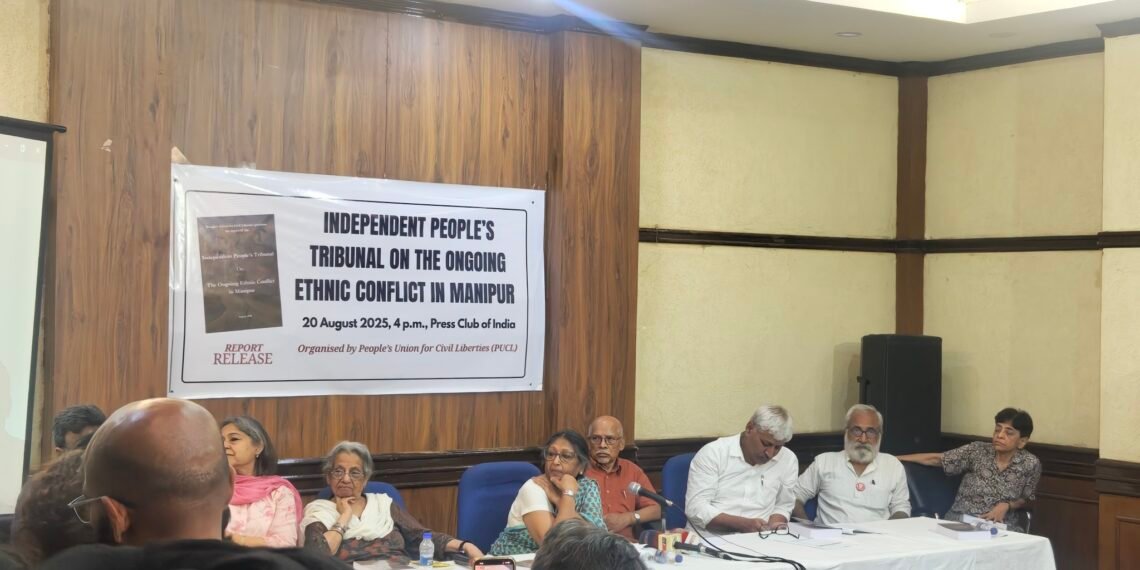Global Citizens for Kuki-Zo welcomed the Independent PUCL Tribunal report on Manipur’s ethnic conflict, stressing that justice cannot be achieved by “equalising suffering” but by holding the state accountable.
BY PC Bureau
New Delhi, Aug 26, 2025 — The Global Citizens for Kuki-Zo has welcomed the findings of the Independent People’s Tribunal on the Ongoing Ethnic Conflict in Manipur, constituted by the People’s Union for Civil Liberties (PUCL), while stressing that justice lies not in equalising suffering but in recognising state complicity and ensuring accountability.
The Tribunal report, chaired by former Supreme Court judge Justice Kurian Joseph, is the most comprehensive attempt yet to document the ethnic violence that began on May 3, 2023, and continues to haunt the state. Established in March 2024, the Tribunal was tasked with documenting human rights violations, examining the role of constitutional authorities, assessing security agencies’ conduct, and recommending measures for justice and reconciliation.
In its statement, Global Citizens for Kuki-Zo (GCKZ) described the Tribunal’s findings as a landmark intervention. “Justice is not arithmetic. It is accountability,” the group said. “The Tribunal has performed the duty the Indian state abdicated: it bore witness to atrocities, named perpetrators, and exposed constitutional failure.”
Pogroms, Not “Clashes”
The GCKZ strongly endorsed the Tribunal’s rejection of the “both-sides narrative.” While acknowledging that both Meiteis and Kuki-Zos were displaced, the Tribunal documented overwhelming evidence of asymmetrical violence.
READ: Kuki-Zo Council Backs PUCL report on Manipur Ethnic Violence, Cites “Irreversible Divide.”
“This is not mere ‘clash.’ It is a pogrom enabled by power. To reduce this to ‘both sides suffered’ is not inclusivity — it is denial,” the GCKZ review noted.
The Tribunal cited testimony that Meitei militias Arambai Tenggol and Meitei Leepun looted between 4,000–7,000 weapons from state armouries, moved freely in police vehicles, and intimidated political leaders. Survivors recounted systematic burning of villages, gang rapes, desecration of more than 250 churches, and the public parading of women.
One security officer admitted to the Tribunal that Manipur had been turned into a “de-weaponised society in reverse” — where vigilante groups had more firepower than the state itself.
PUCL Flags Judiciary Over Silence During Manipur Violence#PUCL #Manipurviolence #JudicialAccountability #KukiZo#RuleOfLaw #CourtsAndCrisis #JusticeDelayed https://t.co/nGMg4KJYYr
— POWER CORRIDORS (@power_corridors) August 25, 2025
Rejecting “False Symmetry”
The press release criticised commentary in The Frontier Manipur and Imphal Review of Arts & Politics for misrepresenting the Tribunal’s scope by demanding equal attention to all communities’ narratives.
“To demand ‘equal space’ for narratives that erase or relativise pogroms is to collude in denial,” the statement said, warning that such calls undermine the constitutional accountability focus of the Tribunal.
READ: ED Raids AAP Leader Saurabh Bhardwaj in Hospital Scam Probe
The GCKZ emphasised that the Tribunal’s mandate was clear: to investigate state complicity and the gravest human rights violations — not to conduct an ethnographic balancing of losses.
Sexual Violence as Central Evidence
The Tribunal’s focus on gendered violence drew special endorsement from GCKZ. Testimonies of gang rapes, humiliation of women, and sexualised violence against minors were documented as evidence of crimes against humanity.
Responding to critics who demanded “equal detail” on Meitei losses, the GCKZ declared: “Sexual violence is not collateral damage to be weighed against property destruction. It represents the collapse of humanity itself.”
State and Media Complicity
The Tribunal’s report also highlighted the failures of constitutional authorities and institutions, indicting the Biren Singh government for arming vigilantes “by omission and commission.” It criticised the Prime Minister’s silence, the judiciary’s inability to check errors, and the NHRC’s failure to uphold its mandate.
Equally significant was the finding on media complicity. According to the report, valley-based media became echo chambers, silencing Kuki-Zo voices while legitimising vigilante narratives.
“Homes of dissenters were attacked, journalists intimidated, and narratives scripted to erase Kuki-Zo voices,” the GCKZ said. “This explains why so many local outlets now rush to brand the Tribunal as ‘biased’: its findings expose their complicity.”
Concluding its statement, the Global Citizens for Kuki-Zo stressed that reconciliation cannot be built on forced symmetry.
“As comparative truth commissions from South Africa to Rwanda have shown, reconciliation begins by naming asymmetry, not by balancing it away,” it said. “For the survivors of Manipur, truth is not an academic exercise. It is the difference between erasure and recognition, between silence and dignity. On that count, PUCL has succeeded.”














